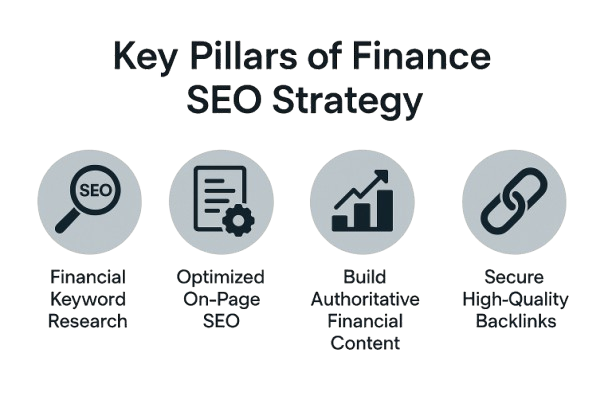Discover expert SEO for finance tips that boost traffic and trust. Learn how a financial content marketing agency can elevate your strategy.
Struggling to Attract Clients to Your Financial Website?
If you’re a financial services provider trying to grow your digital presence, you’re not alone. With countless financial brands competing for digital visibility, standing out in search results requires more than presence—it demands precision, authority, and a smart SEO strategy.
Fortunately, this guide is designed to walk you through proven SEO strategies specifically tailored for the financial services sector.
From keyword research to content marketing and on-page SEO, you’ll learn how to implement tactics that improve visibility, credibility, and conversions for your finance.
Why SEO for Finance is Crucial in 2025
As more people turn to search engines to find financial advisors, investment guides, and loan services, showing up in search results has never been more important. SEO for finance enables your business to:
- Increase organic traffic.
- Build trust and authority.
- Reach the right audience at the right time.
- Reduce paid advertising costs.
Whether you’re a bank, wealth manager, insurance provider, or credit union, SEO can help you stand out in a crowded market.
Key Pillars of Finance SEO Strategy

- Financial Keyword Research
Effective SEO begins with identifying keywords your target audience is searching for. Focus on:
- High-intent keywords like “best financial advisor near me”
- Informational phrases such as “how to file taxes for small business”
- Long-tail keywords like “financial services content marketing agency for small businesses”
Use tools like Google Keyword Planner and SEMrush to find keywords with high relevance and reasonable competition.
- Optimized On-Page SEO
Ensure your website includes:
- Primary keywords in meta tags, headers, and URLs
- Schema markup for articles and reviews
- Mobile responsiveness and fast loading times
Make sure each page offers a great user experience, especially on mobile.
- Build Authoritative Financial Content
Google rewards helpful, expert-level content. As a financial content marketing agency would suggest:
- Create in-depth blog posts, how-to guides, and calculators.
- Update content regularly to maintain relevance.
- Use data, charts, and examples to increase credibility.
This is where seo financial services shine—they ensure your content is not only optimized but valuable.
- Local SEO for Financial Services
Many financial decisions are made locally. To appear in “near me” searches:
- Claim and optimize your Google Business Profile.
- Get listed on local directories.
- Encourage clients to leave reviews.
- Secure High-Quality Backlinks
Backlinks from reputable sources signal trust to search engines. Earn them by:
- Publishing guest posts on finance publications
- Getting cited in financial news outlets
- Partnering with industry organizations
Avoid black-hat link-building tactics. Focus on quality over quantity.
Enhancing SEO with Financial Calculators and Interactive Tools
One often-overlooked yet powerful SEO tactic in the finance sector is offering interactive tools like loan calculators, retirement planners, or mortgage estimators directly on your website. These tools not only boost user engagement but also serve multiple SEO functions.
Why Do They Matter for Finance SEO?
Interactive tools improve user experience, increase average session duration, and reduce bounce rates—all of which are favorable signals to search engines. For example, a well-designed loan calculator can help users make quick financial decisions, encouraging them to stay longer and explore more of your site.
Additionally, these tools are highly shareable, especially when embedded within valuable content. Users are more likely to link back to useful resources, increasing the chances of earning quality backlinks—a key ranking factor in SEO.
Capturing Transactional Search Intent
When users search for terms like “best personal loan rates” or “how much can I save for retirement?”, they’re often ready to act. By providing tools that address these needs, you align your content with transactional intent, which not only enhances visibility but also leads to higher conversion rates.
A financial content marketing agency would recommend integrating such tools as part of a comprehensive strategy, helping convert passive visitors into active leads through utility-driven content.
Key Considerations for Financial Services SEO
Several factors are critical when implementing SEO for finance, particularly given the regulated nature of the industry:
- Legal Compliance
The finance sector is governed by regulations such as the Equal Credit Opportunity Act, Truth in Lending Act, and Consumer Financial Protection Bureau (CFPB) guidelines. All marketing materials, including website content, must be reviewed by legal or compliance experts to avoid violations. This ensures content updates reflect current laws, maintaining relevance and avoiding penalties.
- Building Trust and Credibility
Trust is paramount in the financial industry. Showcasing certifications, client testimonials, and professional accolades can significantly boost credibility. Enhancing your site with structured data—such as review and rating schema—can lead to rich results that improve visibility and click-through rates. Additionally, making it easy for clients to leave reviews through your website, email campaigns, or social platforms encourages engagement and reinforces legitimacy. A well-maintained and complete online profile further increases the likelihood of being perceived as trustworthy by potential clients.
To achieve this at scale, many financial brands are leveraging offshore website development services to build secure, high-performance websites while keeping development costs efficient and timelines tight.
- E-E-A-T (Experience, Expertise, Authoritativeness, Trustworthiness)
Google emphasizes E-E-A-T for YMYL content, which includes finance. This involves highlighting team qualifications, contributing to reputable publications, and ensuring content is transparent and well-cited. Using person schema markup to showcase author credentials on blog posts or guides can further enhance digital reputation.
The Role of a Financial Content Marketing Agency
A financial content marketing agency brings:
- Industry-specific writing expertise
- Knowledge of compliance and regulatory standards
- Strategic content planning and distribution
They work behind the scenes to create compelling content that attracts traffic while keeping your brand voice intact.
Whether you’re outsourcing completely or need support with specific campaigns, collaborating with content experts can fast-track your SEO success.
Technical SEO for Finance Websites
Don’t let poor site structure hold you back. Technical SEO includes:
- XML sitemaps and robot.txt optimization
- HTTPS and secure browsing
- Proper use of headers and internal linking
- Fixing broken links and improving crawlability
Regular technical audits are essential to maintain strong site health.
Financial Services Content Marketing Strategy
Your content should do more than just rank—it should convert. Here’s how to build an effective strategy:

- Know Your Audience
Segment users by:
- Financial goals
- Income levels
- Demographics
Create content for different stages of the buyer’s journey: awareness, consideration, and decision.
- Content Types That Work
- Educational blog posts
- Infographics on financial planning
- Videos explaining complex terms
- Email newsletters and guides
- Repurpose and Promote
Use social media, emails, and financial forums to share your content widely. Repurpose blog content into videos or checklists to reach wider audiences.
Measuring SEO Success for Financial Brands
Track performance with:
- Google Analytics and Search Console
- Keyword ranking tools
- Conversion rate metrics
- Engagement stats (bounce rate, time on page)
Use these insights to refine your strategy over time.
Read more : Dental Internet Marketing 2025: 15 Strategies to Dominate Local & Beyond
Common SEO Mistakes Financial Firms Should Avoid
Even with the right strategies in place, some common SEO pitfalls can silently hold back your website’s performance. Being aware of these mistakes—and knowing how to avoid them—can make a significant difference in your rankings and overall digital success.
- Ignoring Mobile Optimization
In today’s mobile-first world, failing to optimize your website for smartphones and tablets can seriously hurt your search visibility. Google prioritizes mobile-friendly websites in its search results, meaning if your financial site isn’t responsive, you may be losing potential clients before they even engage. A poor mobile experience—slow loading, hard-to-read text, or unresponsive buttons—can lead to high bounce rates and lower conversions.
- Stuffing Keywords Unnaturally
Keyword optimization is crucial, but overusing keywords in your content can do more harm than good. This outdated tactic, known as keyword stuffing, results in poor readability and may trigger search engine penalties. Instead of forcing terms like “finance services” repeatedly, focus on natural integration and use variations or related terms to enhance both user experience and ranking potential.
- Thin or Outdated Content
Google favors comprehensive, relevant, and up-to-date content. Thin pages with little information or outdated statistics can signal low value, leading to lower rankings. For financial firms, it’s essential to ensure that blogs, calculators, and service pages reflect current trends, compliance updates, and accurate financial insights.
- Poor Internal Linking
Internal links help search engines understand your website structure and guide users to relevant pages. Financial websites often neglect this strategy, resulting in orphan pages or missed opportunities to pass link equity. Effective internal linking improves crawlability, user experience, and time on site—all essential for better rankings.
- Lack of Technical SEO Audits
Behind the scenes, technical SEO ensures that your site is accessible, crawlable, and free of errors. Financial websites with broken links, slow page speeds, missing XML sitemaps, or misconfigured robots.txt files can suffer significant visibility losses. Without regular audits, these issues often go unnoticed.
Avoiding these SEO mistakes isn’t just about maintaining your rankings—it’s about building long-term credibility and trust in a competitive industry. By addressing these common errors proactively, your financial brand can save valuable time, reduce wasted marketing spend, and attract higher-quality traffic.
Conclusion: Turn SEO Into a Long-Term Asset
SEO for finance isn’t a one-time task—it’s a long-term investment. With the right strategy, tools, and possibly the help of a seasoned financial content marketing agency, your financial brand can become more visible, credible, and successful online.
Looking to improve your SEO strategy? Explore how finance services can give your business a competitive edge.
FAQs on SEO for Finance
What is finance SEO?
Finance SEO is the process of optimizing financial websites to improve visibility on search engines, drive relevant traffic, and convert visitors into leads or clients.
Why do financial services need SEO?
Because finance is a highly competitive and trust-based industry, SEO helps in building authority, reaching target audiences, and improving lead quality.
What does a financial services content marketing agency do?
They specialize in creating and distributing finance-related content that ranks well and complies with industry regulations.
How do finance SEO services differ from general SEO?
Finance SEO services involve specialized keyword research, compliance considerations, and a deeper understanding of user intent in the financial sector.
Share your thoughts in the comments below or explore more insights on how to boost your brand visibility online.







